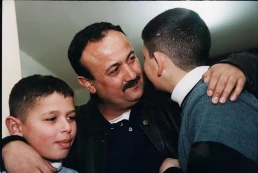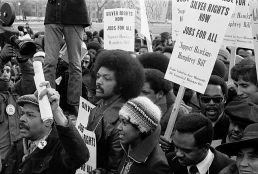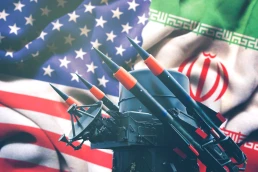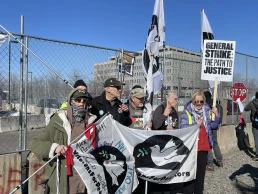His continued imprisonment is not merely unjust; it silences the one leader most capable of uniting the Palestinian people and leading them toward a political solution.
By Medea Benjamin, Common Dreams
For more than two decades, Marwan Barghouti has sat behind Israeli bars—a living emblem of a brutal occupation that has denied Palestinians their freedom and dignity. His continued imprisonment is not merely unjust; it silences the one leader most capable of uniting the Palestinian people and leading them toward a political solution. Polls over many years show he is the most popular Palestinian political figure, trusted across factions and generations—even by many who have lost faith in politics. Releasing him is not a concession. It is a prerequisite for peace.
When the Second Intifada (uprising) began in 2000, Barghouti was a prominent member of Fatah, the Palestinian political faction that dominates the Palestinian Authority (PA), which governs limited parts of the occupied West Bank. He was also an elected parliamentarian. He was arrested by Israeli forces on April 15, 2002, and in 2004 an Israeli court convicted him and sentenced him to five life terms plus 40 years, accusing him of involvement in attacks that killed Israelis. Barghouti denied the charges, refused to recognize the court’s legitimacy, and declared himself a political prisoner under occupation.

Independent observers, including the Inter-Parliamentary Union, later found that the proceedings failed to meet international fair-trial standards and bore the marks of political persecution.
Barghouti’s case is inseparable from the larger machinery of occupation: like thousands of other Palestinian prisoners, he has endured brutal and degrading treatment, including torture, solitary confinement, and denial of adequate medical care. Israeli authorities are obligated under international law to ensure due process, humane treatment, and access to counsel and healthcare—obligations they routinely violate.
[The case of Marwan Barghouti] is inseparable from the larger machinery of occupation: like thousands of other Palestinian prisoners, he has endured brutal and degrading treatment, including torture, solitary confinement, and denial of adequate medical care.
Throughout his imprisonment, Barghouti has supported a principled stance: he rejects attacks on civilians and defends the right of a people living under military occupation to resist within international law. He has long advocated for negotiations grounded in equality and self-determination. That combination makes him uniquely capable of serving as a key mediator.
It is precisely this credibility that Israel fears. As his son Arab Barghouti said, “Israel sees my father as a danger because of his ability to bring Palestinians together.” Keeping him locked away serves two aims for Israel: decapitating credible Palestinian leadership and perpetuating the fiction that “there is no partner for peace.”
His family fears for his life, with witness reports that he was severely beaten by guards in September. That fear increased on August 15, 2025, when Israeli Minister Itamar Ben Gvir released a video in which he personally threatened Barghouti inside his prison cell.
The family has repeatedly asked Israel to allow international lawyers and the International Committee of the Red Cross to visit him, but their requests have been denied.
There was hope that Barghouti would be released as part of the recent Gaza ceasefire agreement between Israel and Hamas, and Trump said he was considering pressing Israel for his release, but Israel refused.
For years, world leaders have championed his cause. In 2013, Former President Jimmy Carter, Archbishop Emeritus Desmond Tutu, and other prominent world leaders and Nobel Peace Laureates called for his release. More recently, UN Special Rapporteur Francesca Albanese said, “Anyone serious about ‘peace’ should ensure his release, as the most popular—and unlawfully detained—Palestinian leader.” On October 29, a group of global leaders called The Elders, which was started by Nelson Mandela in 2007, called on President Trump to demand Barghouti’s release, “capitalising on the opportunity opened up by the fragile ceasefire deal in Gaza.”
Even senior Israeli security figures, including former Shin Bet director Ari Ayalon, have acknowledged that if Israel truly wants a partner who can deliver the Palestinian public to an agreement, Barghouti is the one leader with the legitimacy to do it.
But perhaps the most interesting recent advocate is Ronald Lauder, president of the World Jewish Congress, who–behind the scenes–lobbied for Barghouti as a gesture to the Arab countries pushing for his release.
Barghouti’s popularity as a uniting figure is why so many Palestinians call him their Nelson Mandela. Mandela’s release did not solve South Africa’s problems overnight, but it unlocked a door that had been nailed shut. Barghouti’s freedom could do the same.
If Israel truly seeks peace, it must stop locking away the very leadership capable of achieving it. If the international community truly stands for human rights, it must raise the political cost of Barghouti’s continued detention.
Recent Posts
The Left Owes a Lot to Jesse Jackson
February 19, 2026
Take Action Now As a movement builder, spokesperson, and candidate for the presidency, Jesse Jackson’s accomplishments were massive. He was one of…
Trita Parsi Warns U.S. & Iran Have Incentives to Escalate Conflict
February 19, 2026
Take Action Now “We have a very dangerous situation, because both sides actually believe that a short, intense war may improve their…
Minneapolis: Organizing for the Protection of the Community
February 18, 2026
Take Action Now In speaking with residents in several parts of Minneapolis, beautiful stories of organizing on a block-by-block level emergedBy…
U.S. Sent a Rescue Plane For Boat Strike Survivors. It Took 45 Hours To Arrive.
February 17, 2026
Take Action Now In seas that could kill a person within an hour, it took nearly two days for a rescue plane to arrive.By Tomi McCluskey and Nick…




